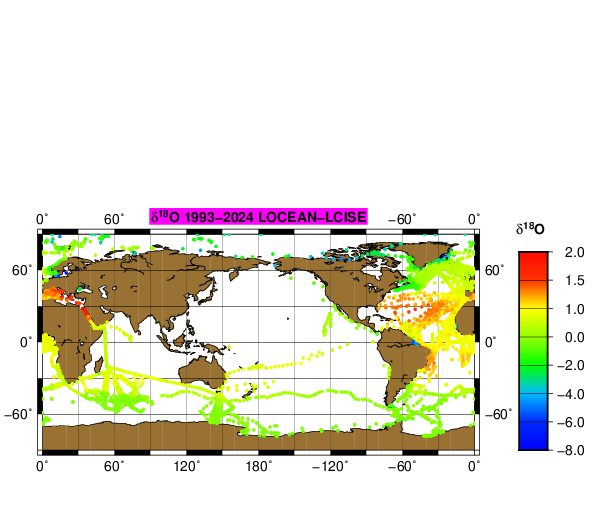The stable isotopic composition of seawater and the carbon isotopic composition of dissolved inorganic carbon are essential ocean tracers that have been widely measured since the 1960s.
They fingerprint current changes in the hydrological and bio-geochemical cycles, as well as anthropogenic carbon penetration. However, substantial issues of data collection, quality control, and compilation have amplified: common reference materials in seawater are not available; analysis methods have strongly diversified; regular intercomparison exercises are lacking; and, as a result, large differences exist between data sets. These differences if they persist will hinder the community effort from making full use of stable isotopes to identify climatic changes.
This working group intends to remedy the current issues of data collection, quality control, and compilation of stable isotopes in seawater, as well as to improve international networking and a varying degree of national capacity. We will assess the validation stage of the available datasets, as well as corresponding metadata and where and how they are communicated. This effort will lead to a report of best practices from sample collection to measurement and quality control, and will include recommendations on reference materials. We will review current methods for bias adjustment in archives and make recommendations to standardize these bias adjustments and work towards complementing existing databases. In parallel, the working group will promote intercomparison exercises, and will actively carry out capacity building, as the measurements techniques are now widely available and at a cost that is accessible to a larger number of countries and research institutions.
- Chair(s)
- Gilles Reverdin (France), Antje Voelker (Portugal)
- Other Full Members
- Alyssa Atwood (USA), Helen Bostock (Australia), Fajin Chen (China-Beijing), F. Alexander Haumann (Germany), Supriya Karapurkar (India), Eun Young Kwon (South Korea), Juan Muglia (Argentina), Igor Martins Venancio P. de Oliveira (Brazil)
- Associate Members
- Shigeru Aoki (Japan), Luisa Espinosa (Colombia), Sarah Fawcett (South Africa), Anita Flohr (UK), Prosenjit Ghosh (India), Roberta Hansman (USA), Ulysses Ninnemann (Norway), Dharma Reyes Macaya (Chile/UK/Germany), Douglas Wallace (Canada), Leonard I. Wassenaar (Austria), Liping Zhou (China-Beijing)
- Reporter
- Hilkka Ndjaula
- Terms of Reference
Assess the existing best practices and standard measurement procedures, including new techniques such as CRDS, and identify reference materials (liaise with IAEA for water isotopes and the Ocean Carbon & Biogeochemistry (OCB) working group for carbon isotopes in the ocean, as well as with the IAPSO-BP-SG on DIC).
Assess which data and metadata are stored, what is their validation/ qualification status, and how and where they can be recovered. Establish a unified standard of data distribution (metadata and data) that allows an effective quality control to be shared between producers and scientific users.
Organise intercalibration exercises. Subdivide large volumes of deep and surface seawater from different cruises into subsamples to be distributed to a large set of laboratories using different measurement techniques, and in different oceanic regions.
Assess methods (Quality Control/Quality Assessment) to evaluate the accuracy of already available data, such as comparing different data subsets in the same region, using derived properties such as d-excess, or the d13C-DIC relationship, and estimating the internal consistency of the global or regional databases.
Report on the results/outcome/perspectives at international conferences and in publications and actively promote capacity building through four workshops and exchange visits in order to widely disseminate the new international standards co-constructed in MASIS for producing and reporting high quality seawater isotope measurements (Tor 1-4). This is expected to facilitate the merging of data sets into a global database allowing for long awaited synthesis and modelling studies.
- Approved
- October 2024
- Financial Sponsors
- SCOR, NSF
